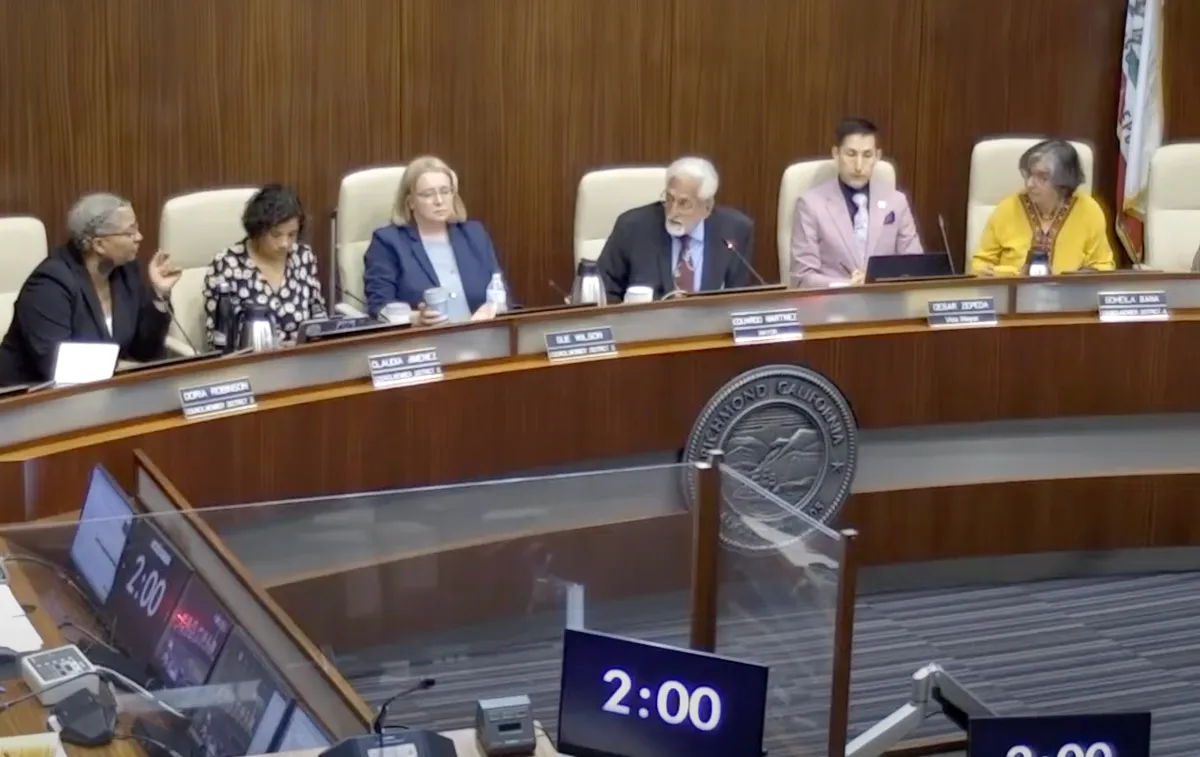

The Richmond City Council voted Tuesday to establish a sister city partnership with Sebastia, an ancient town in the West Bank, making it the city’s fourth international sister city.
The 5–1 vote came after a detailed discussion and some emotional testimony. Vice Mayor Cesar Zepeda cast the lone dissenting vote, arguing Sebastia’s population of about 3,000 and its location under Israeli security control could complicate meaningful exchanges. Zepeda suggested nearby Nablus, which has about 174,000 residents and existing U.S. sister city ties, as a better alternative.
Mayor Eduardo Martinez, who co-sponsored the resolution with Councilmembers Claudia Jimenez and Soheila Bana, said the partnership could help “build bridges” through people-to-people diplomacy, similar to Richmond’s relationships with Shimada, Japan; Zhoushan, China; and Regla, Cuba.
 Grandview IndependentSoren Hemmila
Grandview IndependentSoren Hemmila
“By connecting with Sebastia, we can foster understanding of their culture and have them understand ours so that we can build bridges, which is very important at this time,” Martinez said.
Public comment reflected the deep divisions over the issue. Several speakers opposed the measure, raising concerns about safety and antisemitism. Richmond resident Sue Kaun noted the city’s positive sister city exchanges with Shimada, but questioned choosing Sebastia.
“I wonder how many of the city council members have visited this city in Samaria and how many have visited Israel,” Kaun said. She called Nablus a hub for militant groups and said she couldn’t find a tour guide willing to take her there during a recent visit. “It is disappointing to me that the city council is considering this particular city as a sister city.”
Supporters described Sebastia’s 5,000-year history and hardships under Israeli occupation. Tarnell Abbott, a longtime participant in Richmond’s Cuba sister city program, mocked what she called exaggerated fears.
“Look out, there’s a terrorist underneath every bush! Run, hide, cover your heads, help, help, the terrorists are here!” Abbott said, before adding that sister city programs are about human connections when national governments fail. “If we don’t reach out a hand as a city to take the hand of another city, who’s going to do it?”
Councilmember Jimenez said establishing the partnership sends a strong symbolic message about Richmond’s values.
“Establishing a city partnership between Richmond and Sebastia is a powerful step toward demonstrating our solidarity with the Palestinian community, both here at home and abroad. It sends a clear message that we do not support the ongoing war and the tragic loss of life among innocent civilians, including children, mothers and families in Palestine,” Jimenez said.
Councilmember Doria Robinson said her own visits to Israel, Gaza, and the West Bank shaped her vote.
“There is no better substitute to understanding what is going on than to see it for yourself,” Robinson said. “If we can create a bridge where we can better understand what’s going on, we’ll have a lot better chance of moving forward.”
The resolution says any immediate financial impact will be minimal, limited to staff support. Future costs will be reported as the partnership develops.
Richmond council weighs ban on corporate home purchases
The council also received a presentation on a proposal to restrict corporate ownership of single-family homes as a way to protect residents from displacement and rising housing costs.
Councilmember Bana introduced a draft concept aimed at limiting large-scale investors from buying up local housing stock. The measure would prohibit for-profit corporations and institutional investors from purchasing single-family homes, duplexes, and fourplexes in Richmond. Current owners would be unaffected.
“We cannot allow big corporations like Blackstone to grab our homes,” Bana said. “Housing is not just a commodity; it is a human right.”
Attorneys from the Sustainable Economies Law Center presented research showing that about 1,000 of Richmond’s roughly 30,000 single-family homes are already corporate-owned. They argued speculative investment drives up rents and contributes to displacement, especially among communities of color.
The draft concept envisions allowing only people, nonprofits, cooperatives, and public entities to buy these types of homes going forward. The policy is still in early discussion stages, with questions about thresholds, enforcement, and unintended consequences.
Councilmembers expressed support for protecting residents but raised concerns about the details.
“I want to be real careful about cause and effect,” Councilmember Sue Wilson said. “I’m not convinced yet that corporate ownership is the reason for our high housing costs. There are other forces at play. We need to make sure we focus on solutions that address the true causes.”
No vote was taken. The council will continue refining the proposal with input from community groups and city attorneys. Supporters hope Richmond can become a model for other California cities considering similar restrictions.
SUPPORT LOCAL JOURNALISM - SUBSCRIBE TODAY!
Grandview Independent needs your financial support to continue delivering the news that matters to our community. Quality journalism costs money, and we can't do it without readers like you.
SUBSCRIBE NOW and get:
• Unlimited access to all articles
• Newsletters with exclusive content
• The satisfaction of backing independent local news that serves your community
CLICK HERE TO SUBSCRIBE - Starting at just $10/month
FOLLOW US FOR BREAKING NEWS:
• Twitter: @GrandviewIndy
• Instagram: @GrandviewIndependent
• Facebook: @Grandview Independent
Copyright © 2025 Grandview Independent, all rights reserved.
